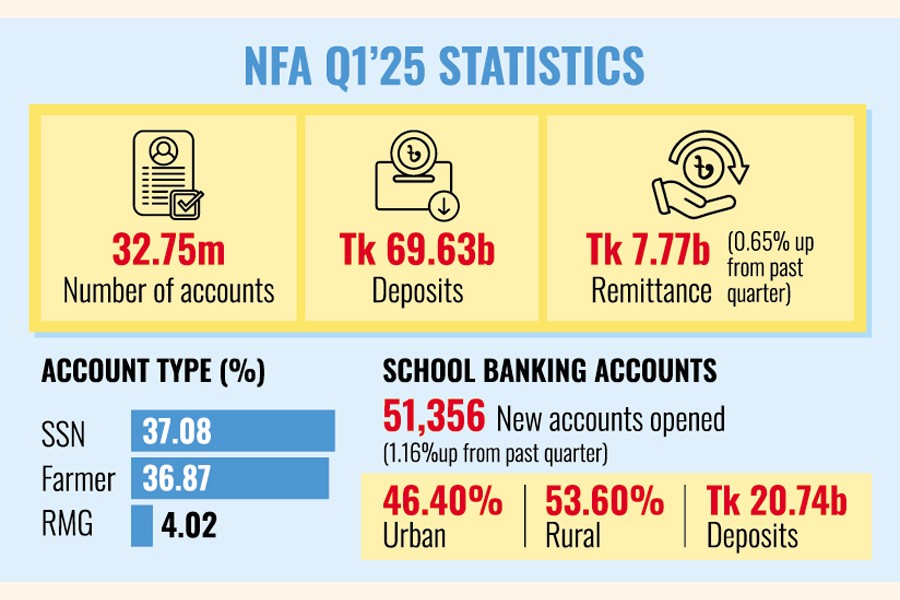
Published :
Updated :

Bangladesh's efforts to broaden financial inclusion continue to gain momentum, with no-frill accounts (NFAs) attracting deposits of Tk 69.63 billion and channelling Tk 7.77 billion in inward remittances as of March 2025.
These low-cost bank accounts - tailored for low-income groups, students, farmers, and other marginalised communities - now number over 32.75 million, playing a pivotal role in connecting the unbanked population to the formal financial system.
The accounts, which require initial deposits as low as Tk 10/50/100, held a combined deposit of Tk 69.63 billion, according to the latest quarterly review released by the Bangladesh Bank (BB).
NFAs also play a key role in remittance flows. By the end of the March 2025 quarter, cumulative inward remittances received through NFAs reached Tk 7.77 billion.
The BB data showed the amount of remittance inflows was 0.65 per cent higher than the cumulative amount received by the end of the December 2024 quarter.
The country has been seeing a growing trend in remittances for the last few months.
Launched to bring the marginalised population under formal financial services, NFAs are now widely used not only for savings but also for receiving remittances, accessing the government's social safety net benefits, and even getting small-scale credit through targeted refinance schemes.
The Bangladesh Bank introduced the Tk 10 account for farmers in 2010 as one of the significant financial inclusion initiatives to bring rural communities living on agriculture under the umbrella of formal financial services.
The quarterly review of NFAs for the March 2025 quarter reveals significant progress in bringing the underserved population into the formal banking system.
Among these, Tk 10/50/100 accounts (excluding school banking and street urchins/working children accounts) accounted for over 28.24 million accounts and held over Tk 48.88 billion in deposits.
This category saw a 0.40 per cent quarterly increase and a 3.57 per cent year-on-year growth in the number of accounts.
The social safety net (SSN) programmes' Tk 10 accounts remained the largest category, contributing 37.08 per cent of all Tk 10/50/100 accounts.
Farmers' accounts followed closely, making up 36.87 per cent of the total NFAs during the reporting period.
A small but significant component of Tk 10/50/100 accounts is the NFAs for readymade garment (RMG) workers, which constituted 4.02 per cent of the total Tk 10/50/100 accounts.
To support these account holders, a refinance scheme amounting to Tk 7.50 billion has disbursed a cumulative credit of over Tk 9.53 billion. This support has been instrumental in helping marginalised groups maintain financial resilience.
In terms of youth financial inclusion, 51,356 new school banking accounts were opened in the reporting quarter, marking 1.16 per cent increase over the previous one - a growth largely attributed to the revival of school banking conferences nationwide.
The total amount of deposits in these accounts stood at more than Tk 20.74 billion as of March 2025.
Of the total accounts, 46.40 per cent are located in urban areas and 53.60 per cent in rural areas, indicating wider outreach in rural communities.
In terms of gender distribution, male students hold 51.01 per cent of the total number of accounts, whereas female students account for 48.99 per cent, reflecting relatively balanced participation of boys and girls in the school banking segment.
The top five banks have opened 58.62 per cent of the total number of school banking activities (SBAs).
Among them, Dutch-Bangla Bank ranks at the top with 1,031,198 accounts, covering 23.02 per cent of the total accounts as well as accumulating Tk 4,255.30 million in deposits with a share of 20.51 per cent of total deposits in SBAs.
Islami Bank Bangladesh holds the second position with 14.62 per cent of the total SBAs.
Among the state-owned commercial banks, Agrani, Sonali, and Rupali retain their position in the top five performers of SBAs.
In contrast, the number of street urchins and working children accounts declined by 1.17 per cent from the previous quarter.
Twenty banks have opened a total of 39,170 accounts for this segment.
sajibur@gmail.com


 For all latest news, follow The Financial Express Google News channel.
For all latest news, follow The Financial Express Google News channel.